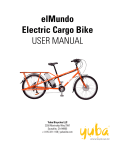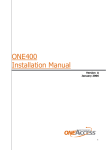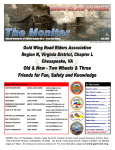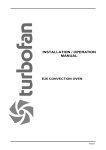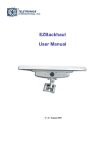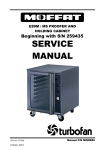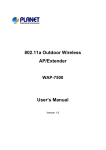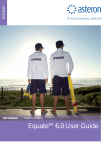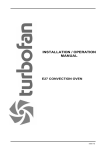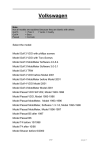Download Multicultural Communities Council SA Transport Service Manual
Transcript
Multicultural Communities Council SA Transport Service Manual 113 Gilbert Street Adelaide SA 5000 Tel: (08) 8345 5266 Fax: (08) 8221 7196 Email: [email protected] Version 2. March 2013 Table of Contents 1 General Information The Service Booking Priority Costs Volunteer Drivers Bookings Use of Buses 2 2 2 3 3 4 Application & Assessment Sample Application & Assessment Form Terms & Conditions of Use Privacy & Confidentiality of Information Assessment & Approval Process Refusal of Service 4/5 6/7 7 8 8 Complaints Process Complaint Procedure Advocacy Flowchart of Complaints Proces 9 9 10 Applicable Policies Environment Workplace Health & Safety Legal Requirements Prioritising between Users Use of Vehicle Policy Volunteer Insurance 11 11 11 11 12 12 Volunteer Drivers - MCCSA Standards Job Description 13 Rights & Responsibilities Transport Service Users Volunteer Drivers 14 15 Accident Procedures/Risk Management Procedures Managing Danger 16 17 MCCSA Bus Fleet -Operating Procedures Layout of Wheelchair Access Bus Seat Fold Away - Instructions Seat Unfolding - Instructions Operating Wheelchair Loader Passengers with Wheelchairs or Scooters Using Overdrive Alternative Community Transport Services Version 2.0 18 19 20 21 / 22 23 / 24 / 25 25 26 / 27 Effective: 1 March 2013 1 GENERAL INFORMATION Effective date of this Transport Services Manual 1st March 2013. THE SERVICE The Multicultural Communities Council of South Australia (MCCSA) has been delivering a Home and Community Care (HACC) funded Transport Service for elderly and disabled people from culturally and linguistically diverse (CALD) community groups across Adelaide since 1987. In twenty five years of operation it has provided an affordable and flexible transport service to over 80,000 elderly people. The service has four HIACE Toyota mini-buses in its fleet, two of which are co-funded by Community Benefit SA. One of the buses has wheelchair access which limits seating to 10 passengers, each of the others has seating capacity for 11 passengers. The buses are petrol driven, automatic vehicles with air-conditioning, tinted windows and each has a first aid kit. All buses have RAA cover, comprehensive insurance and volunteer insurance The use of the service is not limited to HACC clients. Subject to booking priority, it is also available to CALD community organisations which are members of MCCSA. BOOKING PRIORITY 1. HACC clients from CALD backgrounds - booking and access priority. 2. Other CALD community organisations having MCCSA membership - subject to availability. COSTS Hiring fees as at 1 March 2013; a. Up to 50km: $ 45.00 b. 51 to 100km: $ 55.00 c. 101 to 200km: $ 66.00 d. 201 to 300km: $ 90.00 e. 301 to 400km: $105.00 Fees are GST exclusive. f. 401 to 500km: g. 501 to 600km: Over 601 km: $120.00 $140.00 By Negotiation An additional $15.00 contingency levy applies to each booking. Rates subject to change on 14 days notice. Version 2.0 Effective: 1 March 2013 2 VOLUNTEER DRIVERS Depending on availability the MCCSA provide community groups with volunteer drivers upon request. Volunteer drivers provided by the MCCSA have to be reimbursed for their own use of petrol to and from the MCCSA office for each trip they undertake. MCCSA will reimburse these drivers and on-charge the community hirer at 65 Cents per Kilometre. However community groups can provide their own driver, on condition that nominated drivers must: be registered as a community driver with MCCSA have a current C class license have a current police clearance certificate complete the MCCSA Driver Assessment Process complete MCCSA’s medical certificate form be 25 years or older for insurance purposes. agree to be bound by applicable MCCSA policies for users of its Transport Service. BOOKINGS Bookings are taken in advance and cancellations need to be made at least three working days prior to the use date, otherwise a late cancellation fee of $30.00 will be charged unless MCCSA agrees the late cancellation is due to extreme weather conditions. All four buses are in high demand and must be booked in advance. Annual bookings by regular users are required by 15 December each preceding year. Bookings may be made through the MCCSA website, by telephone or in person through the Transport Service Project Officer. USE OF BUSES The buses are currently garaged at the Latvian Hall, 4 Clark Street Wayville. This location may be changed at MCCSA discretion subject to providing users with 14 days notice. Daily Bus Hire is for the hours between 8.30 am and 5.30 pm Monday to Friday. There is no overnight booking and weekend bookings are only allowed in special circumstances at MCCSA's absolute discretion. Use of MCCSA Transport Service is subject to completion of the MCCSA Application and Assessment Form (sample provided below); acceptance of MCCSA Terms and Conditions of Use listed below; and approval of the Application and Assessment Form by MCCSA. Version 2.0 Effective: 1 March 2013 3 APPLICATION & ASSESSMENT FORM - MCCSA TRANSPORT SERVICE Office use only DETAILS OF COMMUNITY Name of community: ……………………………………………… ……………………………………………………………………….. Address of community: ……………………………………………… ……………………………………………………………………….. Postal address if different: …………………………………………… ………………………………………………………………………... Name of contact person: …………………………………………….. Tel: …………………… Fax: ……………..… Mob: ……………….. Email: ……………………………………………………………….. AVERAGE AGE OF COMMUNITY MEMBERS □ Under 60 □ Between 60-70 □ Between 70-80 □ Over 80 DOES ANY PROPOSED PASSENGER HAVE A PHYSICAL DISABILITY □ Yes □ No Details: .................................................................................................................................. .................................................................................................................................. ................................................................................................................ DOES ANY PROPOSED PASSENGER HAVE DEMENTIA □ Yes □ No Details: .................................................................................................................................. .................................................................................................................................. .............................................................................................................................. Version 2.0 Effective: 1 March 2013 4 LIVING ARRANGEMENTS OF PROPOSED PASSENGERS □ Living independently in private accommodation □ Living in low or high care aged facility □ Mixed AREA OF RESIDENCY OF COMMUNITY MEMBERS □ Western metropolitan □ Northern metropolitan □ Eastern metropolitan □ Southern metropolitan MAIN LANGUAGE SPOKEN BY COMMUNITY MEMBERS ……………………………………………………………………… PROPOSED ACTIVITIES OF COMMUNITY □ Excursion □ Club Activity □ Centre Based Service □ Other Detail: ...................................................................................................................... HOW OFTEN DOES YOUR COMMUNITY PLAN TO USE OUR SERVICE ...................................................................................................................................... PREFERRED DAYS TO USE THE TRANSPORT SERVICE ……………………………………………………………………… DOES YOUR COMMUNITY HAVE ITS OWN COMMUNITY BUS/ES □ Yes □ No DOES YOUR COMMUNITY HAVE ANY PREVIOUS EXPERIENCE USING THE TRANSPORT SERVICE OF THE MCCSA □ Never Used □ Used Before □ Applied but was unsuccessful Approx date of Application: EXIT FROM SERVICE (FOR REGULAR USERS ONLY) □ No longer need assistance from the MCCSA Transport service □ Other service provider required □ Service ended due to budget/staff constrain □ Other Detail: ...................................................................................................................... DATE OF LAST ASSESSMENT ……/…....../ 20…… AUTHORISED SIGNATORY: Name: ................................................................................ Position in Organisation: ............................................................................... Signed: Date: ............................ Version 2.0 Effective: 1 March 2013 5 TERMS & CONDITIONS OF USE OF TRANSPORT SERVICE The following terms and conditions apply to the hire of MCCSA buses. Use of the buses implies acceptance of these terms and conditions: 1) Buses and keys must be collected from the MCCSA Transport Officer at the Latvian Hall Car Park, or at any other location which may be advised by MCCSA from time to time, between the hours of 8.30am and 10.00 am, Monday to Friday. 2) Buses must be returned to the Latvian Hall Car Park, or at any other location which may be advised by MCCSA from time to time, before 5.30 pm, Monday to Friday. 3) Bus keys must be returned to MCCSA Office, 113 Gilbert Street, Adelaide before 5.30 pm Monday to Friday. 4) Buses are to be refuelled prior to return on each hire. Refuelling is by CALTEX Card at CALTEX or WOOLWORTH petrol stations. A CALTEX card is provided for each vehicle together with a PIN NUMBER. 5) No smoking, drinking or eating is allowed on buses. The bus is to be kept free of litter and the interior cleaned before return. Where driven by a community's own driver, a $30.00 cleaning fee will be charged if the bus is returned in an unsatisfactory condition. 6) Any damage, mechanical fault or equipment failure must be reported to the MCCSA immediately. 7) Fines for parking and other road traffic offences are payable by the user community in full if their driving was driving the bus. MCCSA will provide the relevant authorities with full detail of the nominated driver if required by law or if it considers appropriate. 8) A Logbook is provided in each bus, and must be completed in full and signed by the driver on return of the bus. 9) The sliding door of the bus must only be operated by the driver or a carer. Drivers must ensure that passengers do not operate the sliding door and that passengers remain seated and wear a seatbelt while the bus is in motion. 10) The authorised carrying capacity of the bus must not be exceeded and only approved clients and their carers may be transported. 11) Community users must ensure passengers can communicate effectively with the volunteer driver. This may require provision of a bi-lingual carer. 12) Community users must accept responsibility for the health and well-being of passengers including fitness to travel and welfare during the use of MCCSA's Transport Service. 13) Community users are required to give full details of their nominated volunteer driver to MCCSA before use of Transport Service commences. Version 2.0 Effective: 1 March 2013 6 14) As far as practicably possible community users will involve the driver in the day's activities, including provision of a meal if appropriate. 15) Volunteer drivers provided by MCCSA are not to be offered monetary reward for their services. 16) In the event of break down, the RAA must be contacted. There is an RAA key fob on the key ring. 17) Buses are not to be driven outside the boundaries of South Australia. 18) MCCSA will invoice users at the end of each month. Payment is due on the 14th day of the next succeeding month. 19) Cancellation of bookings must be made at least three working days prior to the use date, otherwise a late cancellation fee of $30.00 will be charged unless MCCSA agrees the late cancellation is due to extreme weather conditions. 20) Use of MCCSA's Transport Service is conditional on compliance with its relevant policies and procedures as contained in this manual or as may be otherwise advised from time to time; and with compliance to applicable Government Legislation and Regulations. 21) As far as is reasonably practical, community users of the Transport Service will ensure staff, volunteers and / or other persons acting under the authorised aegis of the community user will comply with these policies, procedures, legislation and regulations during the use of the Transport Service. 22) The community user indemnifies and agrees to keep indemnified, MCCSA, its officers, and its staff in respect of any loss, damage, or liability of any kind incurred or suffered as a result of any breach of these terms and conditions or of its policies contained herein, or caused by any negligent act, error or omission by the user or by its volunteer drivers in connection with the use of MCCSA's Transport Service. PRIVACY AND CONFIDENTIALITY OF INFORMATION The only information held by the MCCSA Transport Service about a community will be information necessary to assess the need for service, and to provide the service. The community representative has the right to withhold information for privacy reasons. Information about a community will not be shared with another agency without the permission of the representative. Community representatives have the right to access information about their community held by the MCCSA. Following a request to access this information a time for inspection will be arranged and an MCCSA staff member made available to assist. Confidential information is stored in a locked cabinet accessible only to staff and executive using the information for the purpose of carrying out their job function. Version 2.0 Effective: 1 March 2013 7 ASSESSMENT & APPROVAL PROCESS The MCCSA Transport Service values the quality of its assessment process to ensure that it meets the needs of community users while ensuring fair and equitable allocation of its resources. Community users should renew their application for use of the service annually. Following initial contact from a potential user, MCCSA will provide an Application & Assessment Form for completion and will arrange for an assessment interview within ten working days of the initial contact. Information and responses provided on the Application & Assessment Form will be the basis for the assessment process. Following the initial assessment, MCCSA will, as soon as practicable, inform the community applicant of its decision regarding the request for transport service. The decision will be either: approval of the application approval subject to a waiting list non-approval If services are offered to a community on a temporary basis, the duration of the service will be clarified. Should the application be unsuccessful, MCCSA will: provide reasons for the non-approval; provide information on other available services; provide information on when, and under what circumstances the applicant could reapply for transport service; inform the applicant of its complaints policy and procedure. Refusal of service The MCCSA may refuse to provide its transport service in the following circumstances: Applicants are ineligible because of HACC guidelines A suitable bus is not available or has been requested by another higher priority group on a given day. In that case, applicants are encouraged to put their request on the waiting list for the required service. Applicants have breached the Terms and Conditions of Use more than three times. In that case, regular users will not be allowed to use the service for their next two scheduled bookings, after which they may reapply to use the service. If the applicant is placed on a Waiting List, MCCSA will: advise of the waiting list for service, and provide an estimate of the waiting time; provide information of alternative services; advise that the waiting list is reviewed every twelve months and that the applicant can request a reassessment at any time if their circumstances changed inform the applicant of its complaints policy and procedure. Version 2.0 Effective: 1 March 2013 8 COMPLAINTS Feedback from Transport Services users is welcomed and encouraged by the MCCSA. Users have a right to complain if they are unsatisfied about the service they are receiving without fear of retribution and can expect complaints to be dealt with promptly. The user has the right to engage an advocate of their choice to negotiate on their behalf with the staff and/or management of the MCCSA. Complaint Procedure 1. Users are encouraged to raise their complaint or concerns with the Transport Officer or a staff member. 2. If the user is not satisfied with the outcome, or not happy to discuss the issue with the staff member concerned, they should contact the Executive Officer, or use an advocate to negotiate on their behalf. 3. If the issue is still not satisfactorily resolved, the user should raise the issue with a member of the management committee. 4. If after approaching the above people, the issue is still not resolved, the user can complain to: Aged Care Complaints Scheme by calling 1800 550 552 or contact the Health & Community Services Complaint Commissioner PO Box 199 Rundle Mall Tel: 8226 8652 Fax: 8226 8620 5. The user should be informed of the outcome of their complaint and ask for their feedback on the complaints procedure. Confidentiality of Complaints If a user has lodged a complaint the details of the complaint will be kept confidential amongst staff and volunteer drivers directly concerned with its resolution. The community representatives' permission should be obtained prior to any information being given to other parties in order to satisfactorily resolve the complaint. ADVOCACY An advocate is a person who, with the authority of the user, represents the user's interests. Users may use an advocate of their choice to negotiate on their behalf. This may be a family member, friend or advocacy service. Advocates will be accepted by the MCCSA Transport Program as representing the interests of a community group. Advocates may be used during assessments, reviews, and complaints or for any other communication between the user and the MCCSA Transport Service. Procedure for Appointing an Advocate Users wishing to use an advocate should inform the MCCSA Transport Service in writing of the name of the person they wish to negotiate on their behalf. The user has the right to change their advocate at any time and should inform the MCCSA Transport Service in writing of any change. Staff should make sure that users are aware of their right to use an advocate, and should regularly remind users of this option. Version 2.0 Effective: 1 March 2013 9 Flowchart of complaints process User Can complain to the Transport Project Officer (TPO) or a Staff member. If the complaint is about the TPO or MCCSA Staff, complaint should be made to the Executive Officer. Volunteer Driver If the problem is solved and satisfied with the outcome, stop. If not satisfied, raise the issue to the TPO. Transport Officer If the problem is solved and satisfied with the outcome, stop. If not satisfied, raise the issue to the Executive Officer. Executive Officer If the problem is solved and satisfied with the outcome, stop. If not satisfied, raise the issue to a member of the Management Committee of the MCCSA. Management Committee of the MCCSA If the problem is solved and satisfied with the outcome, stop. If not satisfied, raise the issue to Aged Care Complaints Scheme or the Health & Community Services Complaint Commissioner (HCSCC). Aged Care Complaints Scheme by calling 1800 550 552 or contact Health & Community Services Complaint Commissioner 8226 8652 for a decsion or action by a neutral body. Version 2.0 Effective: 1 March 2013 10 APPLICABLE POLICIES The MCCSA Transport Service will endeavour to ensure that its service is available to frail, elderly people and people with disabilities from CALD background, and their carers, without discrimination. People will not be excluded from access to the service on the grounds of their gender, marital status, religious or cultural beliefs, political affiliation, particular disability, ethnic background, age, sexual preference or inability to pay. The transport service is for hire by community groups who are members of MCCSA and not for individuals. Environment The MCCSA operates in environmentally friendly surroundings. It aims at achieving continual environmental improvement through implementing a management system with objectives and targets to minimise the environmental footprint by working with staff and volunteers through pollution prevention practices in compliance with legal and other requirements. Workplace Health and Safety The well being of our clients and staff is of paramount importance to the MCCSA. Our staff and volunteers will continually engage with Health and Safety professionals to ensure services are provided in compliance with standard safety requirements. The MCCSA faclitates WHS training and Incident Reporting Mechanisms for volunteers. These processes should be integrated with other planning and management activities as best as possible in accordance with the Workplace Health and Safety Act 2012. MCCSA Transport Service Risk Management Document is available to staff and volunteer drivers on demand. Legal Requirements The MCCSA is aware of its legal and moral obligation to protect the both old and young people in its care, and of its legal liability for any abuse that may occur while in that care. MCCSA is committed to keeping its staff and volunteers, aware of their legal obligations in this regard. Individuals over 18 years of age who are working in a paid or voluntary capacity with MCCSA, and whose work does or may bring them into contact with vulnerable persons must have a current police clearance certificate. Prioritising between community users MCCSA may not be able to meet all demands for its Transport Services. In such circumstances, it will consider the following factors to determine allocation of available buses: Size of community. Communities with their own transport vehicles Number of requested days for the transport service Type of transportation service requested (communities providing centre based service receive more transport assistance) Number of disabled community members (community groups with more physically or mentally disabled members receive more service) Version 2.0 Effective: 1 March 2013 11 Average age of community members Use of Vehicle Policy The following policy applies to the use of Transport Service vehicles: Drivers must have an appropriate current licence before using a motor vehicle; All vehicles are to be used solely for purposes necessary to the provision of Transport Services; The most direct route must be used at all times. Vehicles must be locked at all times when they are unattended; The Transport Officer will ensure that the vehicles are maintained to the appropriate standard by: cleaning the vehicles inside and out on a regular basis making sure that the vehicles have petrol and oil at all times; reporting when the vehicle is damaged, or when repairs are required; making sure that the required servicing and maintenance is carried out; Emergency breakdown service through the RAA is available for the vehicle (not the driver); The Transport Officer coordinates matters related to maintenance, repairs, insurance, garaging etc. of all vehicles; Log sheets for journeys will be kept in each bus. They should be completed for all distances travelled; Petrol is to be obtained from CALTEX petrol stations and will be accounted for against the vehicles not the driver or community. Each vehicle has a purchase card. This card must be used at the petrol station for purchasing petrol only. The card must remain in each bus at all times. Disabled Parking Permits are available for all vehicles from the office. In extreme weather conditions 32 degrees upwards MCCSA will not hire buses out for community use Volunteer Insurance The MCCSA has taken out a volunteer insurance policy to insure all volunteers for any injury they may sustain in the performance of their duties, provided such injury does not result from the negligent act, error or omission of such volunteers or otherwise results from their wilful non-compliance with relevant legislation and regulations. Version 2.0 Effective: 1 March 2013 12 VOLUNTEER DRIVERS - MCCSA STANDARDS JOB DESCRIPTION The Volunteer Bus Driver, (hereinafter in this section 'the driver')will be required to drive an automatic gearshift Toyota Hiace Mini Bus within the boundaries of South Australia. Volunteer Drivers are to be regularly updated on changes to MCCSA’s rules and regulations and they should be provided with the updated transport manual whenever there is a change. As directed the driver will: pick up passengers from their homes and transport them to a designated location. wait until the function is finished and transport passengers back to their homes; return the Bus to its allocated garaging location; assist passengers to board and disembark the bus; load and unload wheelchair passengers; complete log book records; report mechanical faults; maintain the bus in a clean and secure condition; ensure any accidents, damage or incidents are reported to the Transport Officer. Essential Requirements: C class-driving license and a good driving history. Willingness to undertake the MCCSA Volunteer Drivers’ Accreditation Process. Aged over 25 years Desirable Requirements Compassionate and comfortable in dealing with aged, frail and younger disabled people from non-English speaking background. Multicultural awareness and good communication skills. Ethnic background, and/ or able to speak a second language. Patient, polite, understanding and empathetic Conditions of employment. Applicants will be required to undergo a driving test and participate in regular training and development sessions. Working hours are flexible, but usually between 9.00am and 5.00pm during weekdays. Essential out of pocket expenses will be reimbursed. Volunteers working for the MCCSA are covered by a comprehensive Volunteer and Public Liability insurances. Training: Ongoing - as assessed and required Version 2.0 Effective: 1 March 2013 13 RIGHTS AND RESPONSIBILITIES OF TRANSPORT SERVICE USERS Users of MCCSA Transport Service have the following rights and responsibilities, which are based on and refer to HACC guidelines: Rights The community representatives have access to all information about their community, held by the MCCSA Transport Service; In cases where representative have an advocate appointed to act on their behalf, the rights of the advocate are to be acknowledged and respected to the extent stipulated in the advocacy arrangements; The community representatives should be involved in decisions about the communities’ assessment and service plan. They should be aware of all the options available, and any fees to be charged for services rendered; Community representatives should be made aware of the standard of service which they can expect; Services should be provided in a safe manner which is responsive to the social, cultural and physical needs of the consumer group; Communities access to service should be decided only on the basis of need and the capacity of the service to meet that need; Communities have the right to refuse service and refusal should not prejudice their future access to services; Communities have a right to complain about the service they are receiving without fear of retribution; Complaints by community representatives should be dealt with fairly, promptly and without retribution; The representatives may involve an advocate of their choice to represent their community group's interests; Community representatives' views should be taken into account in the planning and evaluation of the service; Community representatives' rights to privacy and confidentiality should be respected. All transport users should renew their membership annually to ensure that MCCSA has a current and accurate data of users of the service. Responsibilities Communities should act in a way which respects the rights of other communities and MCCSA staff and volunteers; Communities need to take responsibility for the results of any decisions they make; Communities are to play their part in helping the MCCSA to provide them with efficient and safe service. Whenever Community groups uses our buses for events involving minors’ community groups should ensure that MCCSA volunteer drivers are not left unsupervised with children as they are not trained on dealing with children. Version 2.0 Effective: 1 March 2013 14 RIGHTS AND RESPONSIBILITIES OF VOLUNTEER DRIVERS Volunteer drivers have the right to: be provided with information about the transport service receive a job description know to whom they are accountable receive clear and concise written instructions receive information on passengers to enable duty of care requirements to be met be respected and supported say no to unacceptable tasks be linked to others undertaking similar roles and valued as a team member offered the opportunity to attend information sessions not be exploited be informed of any changes of circumstances re: the passengers they are transporting have their complaints and concerns addressed be reimbursed for out of pocket expenses, if requested work in a safe and healthy environment be covered by insurance Volunteer drivers have the responsibility to: accurately record the details of trips into the log book respect the rights of passengers including confidentiality and privacy exercise a duty of care at all times refrain from going anywhere isolated with a minor unsupervised when transporting children not consume alcohol or any drugs that might influence driving ability inform the Transport Officer if they are experiencing any difficulty with transporting the community/passengers inform the Transport Officer of any accident that occurs to the bus whilst it is in their care report all incidents through the MCCSA Incident Report form notify the Transport Officer if there is an intention to cease driving on a temporary or permanent basis To inform the MCCSA Transport Officer if they wish to stop driving for a particular community ACCIDENT PROCEDURES Staff and volunteer drivers involved in a motor vehicle accident while driving an MCCSA vehicle should follow the procedures outlined below: stop at once; as far as is safe and practicable, ensure that the vehicle is not posing a further traffic hazard; offer assistance to anyone who might be injured; obtain names and addresses of all witnesses to the accident; report the accident to the police. Version 2.0 Effective: 1 March 2013 15 If another vehicle is involved make sure you obtain and keep a record of the following information: the owner's name, address and telephone number; the driver's name, address and driving licence number or other identification; the name of the owner's insurance company; the make, type and registration number of the car. Identify yourself to the other driver, together with your name, address and registration number. Under no circumstances admit fault or liability for the accident. If personal injury or serious property damage is involved: phone the Transport Project Officer at once. Complete Accident Report Form kept in the bus and give it to the Transport Officer as soon as possible after the accident. If the police attend, make sure you: provide the police with all relevant information about yourself and the other driver; obtain and keep a record of the attending police officer's name, rank, number and station. Record in writing details of the accident while they are still fresh in your mind. Use diagrams to describe the circumstances of the accident. Do not discuss the accident with anyone other than the police or the Transport Officer. WHAT TO DO IN A TRAFFIC ACCIDENT In Australia, more people die in road accidents than in any other type of accidents. Over a lifetime, everyone will witness or be involved in a traffic accident. Anyone could be required to give first aid to those injured. Safety is the first consideration – safety of the first aider, the casualty and bystanders. Casualties may be on or off the road or in a vehicle. They can be in danger unless the site is made safe. Note: Do not remove a casualty from a vehicle unless leaving them in there will put them in danger of further injury. Managing Danger 1. Other traffic is always of primary concern. The accident site has to be managed so that no further accidents occur: Safely park a car at a suitable distance from accident Put on hazard lights If at night, use headlights to illuminate scene Ask bystanders to warn and control oncoming vehicles. 2. Fire can start in any badly damaged vehicle: Switch off vehicle’s ignition Shut off emergency fuel switch of diesel vehicle Prevent smoking near accident site Version 2.0 Effective: 1 March 2013 16 3. Damaged vehicle can be dangerous: Put on handbreak Put vehicle in gear (if not already) Place blocks in front of or behind wheels. 4. High-voltage electricity can be a serious hazard if a car has hit a light or electricity pole: Remain at least 6 metres from any cable Ensure bystanders at least 6 metres from cable Call emergency services Do not attempt to move cable Do not go near a vehicle or try to remove a person from vehicle being touched by high-voltage cables 5. Calling Emegency Services Any traffic accident should be reported to the emergency services as soon as possible: 6. How to call for an ambulance Call 000 Ask for the ambulance service Give the exact place of the accident with directions Give the telephone number of the phone you are using Give the number of the casulties Give an indication of the type and extent of injuries State if any other emergency services are required (ambulance will call other services) Ask for the likely time of arrival of the ambulance Answer further questions If there is a damaged powerline, tell the telephone operator, to ensure that the electricity authority is also contacted. Version 2.0 Effective: 1 March 2013 17 MCCSA BUS FLEET - OPERATING PROCEDURES LAYOUT OF Wheelchair Access BUS 2 Bus 2 seats 10 passengers with wheel chair access. Please note that passengers seated next to the driver must enter via the front door of the bus, therefore they are required a certain level of mobility and strength to get into those seats. Version 2.0 Effective: 1 March 2013 18 FOLDING AND UNFOLDING THE DOUBLE SEAT Version 2.0 Effective: 1 March 2013 19 Version 2.0 Effective: 1 March 2013 20 OPERATING THE WHEELCHAIR LOADER Version 2.0 Effective: 1 March 2013 21 Version 2.0 Effective: 1 March 2013 22 PASSENGERS WITH WHEELCHAIRS MCCSA Buses are not equipped to transport people on Scooters. When using a vehicle to transport passengers with a wheelchair it is important to ensure that both the user and their wheelchair are safely and correctly secured into the vehicle. In many cases, the user may need to remain seated on their mobility device due to their need for more supportive seating and/or a reduced ability to transfer into the passenger seat of a vehicle. Refer to the following standards for further recommendations: AS/NZS 3696.19:2009 Wheelchairs, Part 19: Wheeled mobility devices for use as seats in motor vehicles, AS/NZS 10542.1:2009 Technical systems and aids for disabled or handicapped persons-Wheelchairs tiedown and occupant-restraint systems, Part 1: Requirements and test methods for all systems, AS/NZS 3856.1:1998 Hoists and ramps for people with disabilities – vehicle mounted, Part 1: Product requirements. The Independent Living Centre offers free advice on equipment and techniques to help you with everyday tasks. Independent Living Centre 11 Blacks Road Gilles Plains SA 5086 Phone: 1300 885 886 (SA & NT callers only) or 8266 5260 Fax: 8266 5263 Email: [email protected] Website: www.sa.gov.au/disability/ilc Accessible off street parking is available. Bus routes: From the city T500/T501 or 207/208 to Stop 28 Sudholz Road Timetable information: 8210 1000 USING OVERDRIVE What are the uses of overdrive and when should it be used? (For Bus 2) In simple terms, overdrive is like an extra cruising gear. OD is designed only to be used on the freeway. It conserves fuel during long drives at a steady speed. Not in town driving or heavy traffic as it increase wear to the transmission. Don't push the O/D button unless you are at highway speed (+80km/h). City driving requires leaving overdrive OFF! OD is only useful on mostly flat terrain, and under gentle or no acceleration. It is not advisable to use OD when entering the freeway, as conditions are not known. Drive until you are moving at a comfortable speed (80km/h) then press the button. Using it this way, will maximise efficiency, and will save wear and tear on the transmission. Version 2.0 Effective: 1 March 2013 23 ALTERNATIVE COMMUNITY TRANSPORT SERVICES Information correct as at 1 March 2013. Check with provider for current information. City Council’s Number of Costs Bus driver Notes phone number buses/seats 1 Adelaide Hills City Council “The hut Community Bus” 8339 4400 2 buses: -12 seats -9 seats Free for non-profit organisations Bus driver is not provided 2 Burnside City Council 8366 4200 2 Toyoata Coasters: -17 seats -18 seats 2 Toyota Hiace: -12 seats -11 seats $45 hiring fee $1.00 per kilometre (minimum charge $80) Volunteer Bus driver is provided 3. Campbelltown City Council 8366 9235 1 Bus: -22 Seats $106 GST incl/day Bus driver Buses are is provided available (volunteers) Mondays and Tuesdays only, Anywhere within South Australia. Bus driver Within 100km is provided of the (volunteers) Adelaide CBD $74 GST incl/half day Charge per km for distance travelled in excess of 40kms - $1 4. Charles Sturt City Council 8408 1369 5. Holdfast Bay City Council 8229 9975 6. Norwood, Payneham $ St Peters City Council 8366 4595 Available nights and weekends only. Within the Adelaide Hill City Council area. Community Group (not for profit) within the Burnside Council only and travel within a 100km radius of the City of Burnside 2 buses: -17 seats -13 seats +2 wheelchair access 2 buses: -17 seats -15 seats + 1 wheelchairaccess $11.00 Administration fee + $1.27 per km *prices include GST $1.50/km and a a minimum charge of $20.00 per hire Bus driver Charter trips is provided should not (volunteers) exceed 100km (round trip). 1 bus: -21 seats -17 seats when using wheel chair $82/day $60/half day 86c/km Bus driver is not provided Version 2.0 Effective: 1 March 2013 24 City Council’s phone number 7. Port Adelaide Enfield City Council 8405 6702 8. Tea Tree Gully City Council 8397 7444 9 Unley City Council 8372 5131 Number of buses/seats 5 buses: -22 seates -23 seates -26 seates All buses can take 1 wheelchair Costs Minimum charge $50 Hourly rate $13.20 Kilometre rate $1.30. Bus driver Bus driver is provided (volunteers) 3 buses: -23 seats -21 seats Contact coordinator for more info Bus driver Available is provided when not in (volunteers) use for Council's community transport service. 2 buses: -22 seater can take 1 wheelchair Contact coordinator for more info Bus driver is provided (volunteers) Version 2.0 Notes All four buses are normally available for charter after 4:30pm MondayFriday and all day Saturday & Sunday. Effective: 1 March 2013 25


























